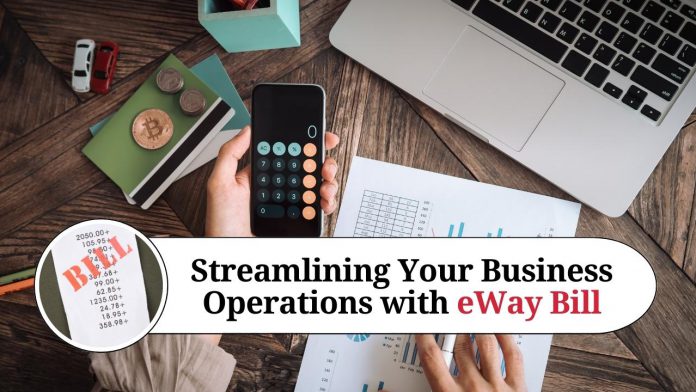EWay Bill: An Overview
In recent years, India has been pushing for a more digitized and streamlined process for goods transported across the country. One such initiative has been the implementation of the eWay Bill system. An eWay bill is an electronic way bill for the movement of goods which can be generated for inter-state and intra-state transportation of goods.
What is an eWay Bill?
An eWay bill is a document that is required for the transportation of goods worth more than INR 50,000 (Single Invoice/ bill/ delivery challan) within a state or from one state to another. The eWay bill acts as a tracking system for goods in transit and ensures compliance with the country’s indirect tax laws.
Why was the eWay Bill introduced in India?
The eWay bill was introduced as a measure to enhance tax compliance and reduce the transit time for goods movement. It aims to make the transportation of goods more efficient and reduce the instances of tax evasion. Additionally, it helps to streamline the supply chain process and makes it easier for businesses to keep track of their goods in transit.
How to Generate an eWay Bill?
Generating an eWay bill is simple and can be done online through the eWay Bill portal. The following steps outline the process of generating an eWay bill:
- Register on the eWay Bill portal using your GSTIN (Goods and Services Tax Identification Number)
- Enter details of the goods being transported, including the invoice/ bill/ delivery challan number, the HS code (harmonized system code) of the goods, the value of goods, etc.
- Enter details of the transporter, including the vehicle number, and the mode of transportation
- Generate the eWay bill
Benefits of the eWay Bill System
- Enhances tax compliance– The eWay bill system helps to improve tax compliance as it provides a mechanism for tracking the movement of goods.
- Reduces transit time– The eWay bill system reduces the transit time for goods as it helps to streamline the supply chain process.
- Makes it easier for businesses to keep track of goods in transit– With the eWay bill, businesses can easily track the movement of their goods in transit.
- Simplifies the process of transporting goods– The eWay bill system simplifies the process of transporting goods as it eliminates the need for multiple invoices and reduces the paperwork involved.
Importance of eWay Bill for Businesses
The eWay bill system is an important aspect of the goods transportation process in India and it is crucial for businesses to understand the requirements and benefits of the system. By generating an eWay bill, businesses can ensure compliance with indirect tax laws, streamline the supply chain process, and make it easier to track the movement of goods.
In addition, the eWay bill system helps businesses to reduce transit time, improve the accuracy of their invoices, and maintain better control over their supply chain.
How to update an eWay Bill?
In case of any changes to the details mentioned in the eWay bill, it is important to update the information. The process of updating an eWay bill is simple and can be done online through the eWay Bill portal. The following steps outline the process of updating an eWay bill:
- Login to the eWay Bill portal using your GSTIN
- Go to the “Update eWay Bill” section
- Select the eWay bill that you wish to update
- Make the necessary changes to the details
- Submit the updated information
It is important to note that the eWay bill can only be updated within 24 hours of its generation. After 24 hours, if any changes are required, a new eWay bill must be generated.
What happens if an eWay Bill is not generated?
If an eWay bill is not generated for the transportation of goods worth more than INR 50,000, it is considered as a violation of the indirect tax laws. Penalties and fines may be imposed on the transporter and the recipient of the goods.
In addition, if the goods are stopped by the tax authorities during transit and an eWay bill is not presented, the goods may be seized and the transporter may be penalized.
Common Issues with eWay Bill and their Solutions
Despite the many benefits of the eWay bill system, some businesses have faced issues with the implementation of the system. Some of the most common issues and their solutions are discussed below:
- Error in Vehicle Number – In some cases, the vehicle number entered in the eWay bill may not match the actual vehicle number used for transportation. To resolve this issue, the transporter can update the eWay bill with the correct vehicle number.
- Technical Glitches– Technical glitches on the eWay bill portal can cause delays and inconvenience. In such cases, it is recommended to wait for a short while and then try to generate the eWay bill again. If the issue persists, it is best to contact the eWay bill helpdesk for assistance.
- Incorrect HS Code– The HS code is a crucial aspect of the eWay bill as it determines the classification of the goods being transported. In case of an incorrect HS code, the eWay bill can be updated with the correct code.
- Transit time exceeding validity period– The validity period of an eWay bill is one day for a distance of up to 100 km and 1 additional day for every 100 km thereafter. In case the transit time exceeds the validity period, a new eWay bill must be generated.
- Lost or misplaced eWay Bill– In case the eWay bill is lost or misplaced, the transporter can retrieve the eWay bill using the GSTIN and the invoice number.
Conclusion
The eWay bill system is a crucial part of the goods transportation process in India and it is important for businesses to understand the requirements and benefits of the system. By generating an eWay bill, businesses can ensure compliance with indirect tax laws, streamline the supply chain process, and make it easier to track the movement of goods.
The eWay bill is a positive step towards a more digitized and efficient system for goods transportation in India. It helps to reduce tax evasion, simplify the supply chain process, and enhance the ease of doing business in the country.
Frequently Asked Questions (FAQs) on eWay Bill
- What is an eWay Bill?
An eWay Bill is an electronic document that is required for the transportation of goods worth more than INR 50,000 within India. The eWay bill is generated through the eWay Bill portal and it serves as proof of the transportation of goods.
- Why is an eWay Bill required?
An eWay Bill is required to ensure compliance with indirect tax laws and to streamline the supply chain process. The eWay bill makes it easier to track the movement of goods and helps to reduce transit time.
- Who is required to generate an eWay Bill?
The transporter of goods worth more than INR 50,000 is required to generate an eWay Bill. This includes both the supplier and the recipient of the goods.
- How is an eWay Bill generated?
An eWay Bill can be generated through the eWay Bill portal. The transporter must enter the necessary information, including the GSTIN of the supplier and recipient, the invoice number, and the vehicle number, among other details.
- What happens if an eWay Bill is not generated?
If an eWay Bill is not generated for the transportation of goods worth more than INR 50,000, it is considered as a violation of the indirect tax laws. Penalties and fines may be imposed on the transporter and the recipient of the goods.
- Can an eWay Bill be updated?
An eWay Bill can be updated within 24 hours of its generation. After 24 hours, if any changes are required, a new eWay Bill must be generated.
- Does the eWay Bill system apply to all modes of transportation?
Yes, the eWay Bill system applies to all modes of transportation, including road, rail, air, and shipping.
- Can the eWay Bill be cancelled?
Yes, an eWay Bill can be cancelled within 24 hours of its generation. After 24 hours, the eWay Bill cannot be cancelled.
- How long is an eWay Bill valid for?
An eWay Bill is valid for 1 day for distances up to 100 km and for 15 days for distances over 100 km.
- What are the benefits of the eWay Bill system for businesses?
The eWay Bill system helps businesses to ensure compliance with indirect tax laws, streamline the supply chain process, and make it easier to track the movement of goods. In addition, the eWay Bill system helps businesses to reduce transit time, improve the accuracy of their invoices, and maintain better control over their supply chain.




















